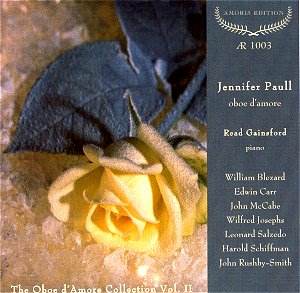New-Zealand-born Edwin Carr has pride of place here,
to a certain extent though, for his pieces, as all others in this collection,
are fairly short. Four Pieces, his earliest work, was
written for the present soloist in 1966-1967. (They also exist in a
version with harp and strings.) A somewhat tongue-in-cheek March is
followed by a Musette and a Pastoral, the whole capped by a lively Almain
("Allemande"). Two Mansfield Poems of
1988 are somewhat more ambitious in terms of overall length and emotional
range, though again the music never outstays its welcome. These are
performed here as songs without words although the the composer specifies
that poems by Katherine Mansfield are to be recited in live performance,
something that Jennifer Paull has always included as an active part
of their integral interpretation in concert. They are in turn a Barcarolle
and a Reverie. Prelude and Aria, his most recent piece
for oboe d’amore so far, was completed in 1990. It is a more abstract,
more exploratory piece than any of the preceding ones and displaying
"the darker side of the oboe d’amore" (the composer’s words),
but still quite attractive.
Blezard’s Two Contrasted Pieces consist
of a meditative Soliloquy followed by a slightly nostalgic Waltz.
Tsiyahi Dikanogisdi (i.e. "music
from the place of the otter" in Cherokee Indian language) by Harold
Schiffman, who has also composed a concerto for oboe d’amore in 1988,
is a short triptych of great melodic charm.
Leonard Salzedo’s Cantiga Mozárabe Op.73
draws on the composer’s Sephardic origins, and the solo part is tinged
with Moorish inflections. (‘Mozárabe’ refers to the period when
Spain was under Moorish rule.) A fairly substantial work, notwithstanding
its concision.
John Rushby-Smith’s Monologue for solo
oboe d’amore is also in three short movements: a bipartite introduction
and fugue (a real tour de force) followed by a short theme and
variations on a folk-like tune and a lively folk-inflected dance, however,
ending with a restatement of the opening recitative-like theme of the
first movement.
Alice’s Reverie by the late Wilfred Josephs
is a chip from his first Alice opera. This short piece, originally for
cello and piano (written for the composer’s daughter), was later re-worked
for double bass and piano (1980) and more recently for oboe d’amore
and piano (1996).
John McCabe has composed two works for Jennifer Paull.
The short Dance-Prelude for oboe d’amore and piano was
completed first (the Oboe d’Amore Concerto followed in 1972). It is
a delightful miniature consisting of an introduction followed by a lively,
syncopated dance. I can imagine this lovely work becoming a popular
encore, in spite of its title!
Most pieces, if not all, were written for Jennifer
Paull who obviously enjoys them all and gives immaculate performances
of these delightful miniatures. She gets a committed support from Read
Gainsford. Excellent recording in remarkably natural acoustics (no clicks
and extraneous noises that too often disfigure similar recitals of music
for wind instruments). This attractive CD, that seems to have passed
unnoticed since the time of its release, is a pure delight from first
to last. A real winner.
Hubert Culot
